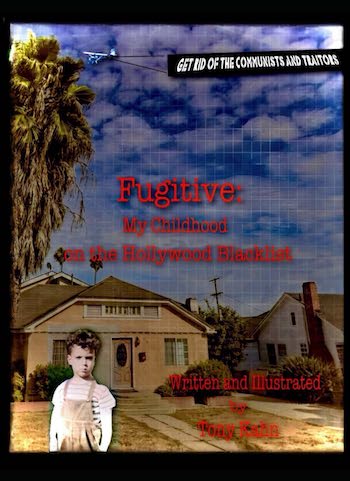Book Review: “Fugitive: My Childhood on the Hollywood Blacklist” — A Still Relevant Warning
By Bill Littlefield
Tony Kahn’s memory is extraordinary, and his talents as a writer, illustrator, and designer are prodigious.
Fugitive: My Childhood on the Hollywood Blacklist, written and illustrated by Tony Kahn. 184 pages, $30
 It can happen here. It did.
It can happen here. It did.
That’s part of the message in the graphic non-fiction volume Tony Kahn calls his memoir. In his case, the “it” was the Red Scare that developed in this country after the Second World War. In the late ‘40’s and early ‘50’s, the House Committee on Un-American Activities grilled members of the movie industry, among other folks, demanding that they not only reveal their own political histories and leanings, but that they denounce others. The charge was that numbers of the people making movies were former or current members of the Communist Party, and that they’d been working radical left-wing propaganda into films. The hunt served as a thin cover for the Committee’s exercise of power and terrorism.
Some of the men and women who appeared, at the insistence of the committee, did provide names of colleagues, and some of them espoused, or had espoused, political beliefs that committee members disapproved of. Among the names provided was Gordon Kahn, Tony’s father.
Other witnesses refused to cooperate. A number of them went to prison.
Gordon Kahn was a screenwriter at the time. In 1948 he wrote a book titled Hollywood On Trial. When rumors of his politics began to spread, children in Tony’s Los Angeles neighborhood began taunting the little boy, shouting “Your father’s a dirty red!”
Eventually, concern that he would be arrested and incarcerated led Gordon to move his family to Mexico.
Kahn was eventually blacklisted. Friends who’d said they’d help him denounced him instead in order to protect themselves from suspicion. On top of that, the writer lost most of his savings to a swindler who’d promised to invest for him with the goal of providing him with enough money to live in Mexico until he could return to the U.S. and work. Meanwhile Tony, who was five when his family moved south, suffered from nightmares and fantasies in which he was being pursued by a monster.
Among the villains in the story are the members of the House Committee on Un-American Activities, including Richard Nixon, and J. Edgar Hoover, the FBI Director who acted as if he saw Reds under around every corner and under every bed. That paranoia increased his influence and power, intimidating anyone who might have stood up to him. Hoover continued to hound the Kahn family, even gathering information on them from informants in Mexico.
The Kahn family eventually moved back to the U.S. They lived for a time in New Hampshire, where Gordon wrote under a pseudonym and Barbara Kahn, Tony’s mother, taught elementary school. When Gordon was called into the office of the Attorney General of New Hampshire, the following dialogue ensued:
Attorney General Wyman: “Your occupation?”
Gordon Kahn: “A writer.”
Attorney General Wyman: “Of what?”
Gordon Kahn: “Of the English language.”
Attorney General Wyman: “I mean of what kind.”
Gordon Kahn: “Self-employed.”

Tony Kahn. Photo: courtesy of the artist
The conversation went on like that for some time. Eventually Attorney General Wyman said he had to take an important phone call. It was from Hoover, ordering an end to the investigation. He’d learned that Gordon Kahn had a heart condition; he was afraid that if Kahn died during questioning the FBI would be embarrassed. He may have also been concerned that Kahn would at some point reveal that, some years previous, he’d seen Hoover prancing around a nightclub in women’s clothes. Kahn, to his credit, never took advantage of that encounter.
Fugitive is passionately told and brilliantly illustrated with photographs, drawings, and documents, including passports, letters, notes, and maps. In part, Gordon Kahn’s plight is powerfully affecting because it is told in such a personal way. Tony’s memory is extraordinary, and his talents as a writer, illustrator, and designer are prodigious. But this book is not only beautiful nor should its importance be confined to its value as a historical chronicle.
The lies and innuendo and willingness to trample the law and the rights of various citizens in order to ruin their lives and consolidate power did not end when the House Committee on Un-American Activities ran out of manufactured rage and the public became tired of the bullshit. The echoes of the persecutions of the time Tony recalls are loud and present in today’s mad, irresponsible charges against immigrants, among others. The urge to capitalize on the fears and prejudices of the American public didn’t disappear with the demise of J. Edgar Hoover. Donald Trump’s contention that Kamala Harris is a communist is an old and barbaric story.
Fugitive is a remembrance of an era that should never be forgotten by citizens of this country. It cries out loudly today as a warning against the persecution of people for what they believe or what they think or what they write at any time, in any place. Readers should be grateful that Tony Kahn has told his story. Tony may no longer be chased by monsters in his dreams, but the brutes have not gone away.
Bill Littlefield volunteers for the Emerson Prison Initiative, a program that helps incarcerated men to earn a college degree. His most recent novel is Mercy (Black Rose Writing).
